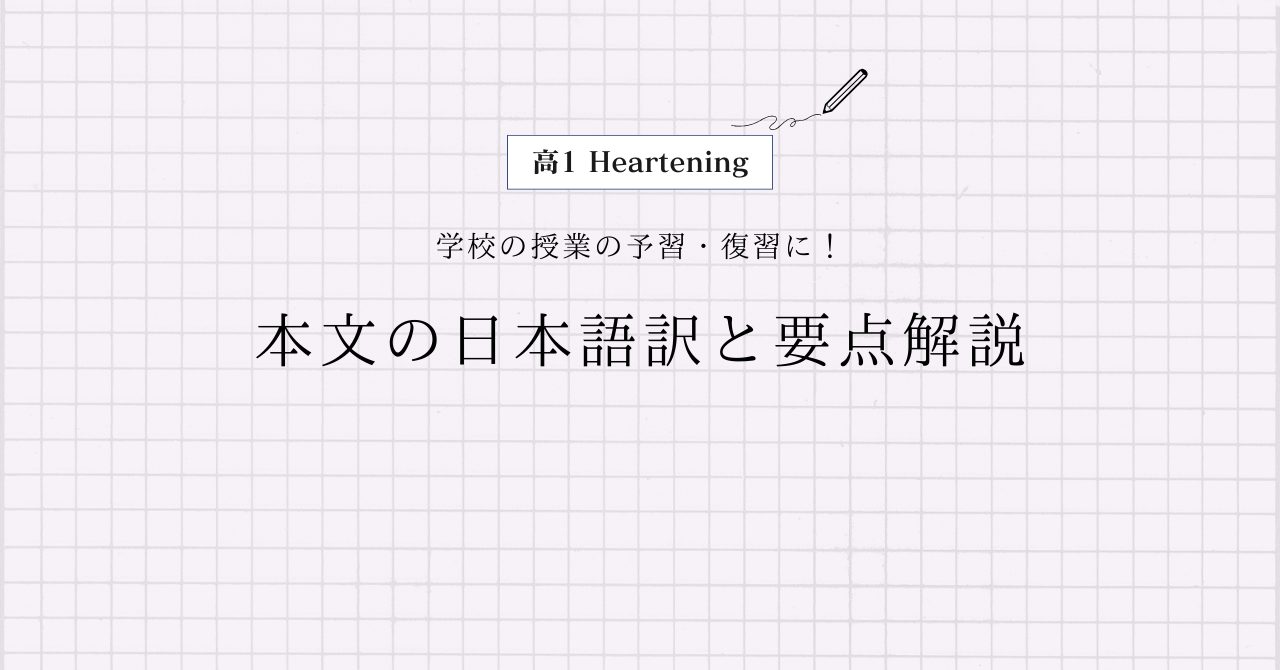桐原書店 高1Heartening Lesson4 Section2の本文の日本語訳と重要箇所の解説です。
Lesson4-1, 4-3, 4-4の解説はこちらからご覧ください。
>高1Heartening Lesson4 Section1 本文和訳
>高1Heartening Lesson4 Section3 本文和訳
>高1Heartening Lesson4 Section4 本文和訳
- Heartening Lesson4 Section2 本文と日本語訳
- Heartening Lesson4 Section2 重要事項の解説
- First, you can nudge people by appealing to their sense of humor.
- A great example of this approach is the World’s Deepest Bin, a public garbage can in Sweden.
- Every time you put in your garbage, it makes a falling sound for eight long seconds, and then there’s a thud.
- In most cases, people get surprised.
- Some of them even come back with another piece of trash in their hand, just to toss it in again.
- During a single day 72 kilograms of rubbish was collected in the bin, while normal bins nearby collected only 31 kilograms on average.
- This bin changes people’s behavior for the better by making it fun to throw away their trash.
- Heartening Lesson4 Section2 まとめ
Heartening Lesson4 Section2 本文と日本語訳
First, you can nudge people by appealing to their sense of humor.
「まず、ユーモアの感覚に訴えることで、人を動かすことができます。」
A great example of this approach is the World’s Deepest Bin, a public garbage can in Sweden.
「このアプローチの良い例が、スウェーデンの公共のゴミ箱である世界一底が深いゴミ箱です。」
Every time you put in your garbage, it makes a falling sound for eight long seconds, and then there’s a thud.
「ゴミを入れるたびに、8秒もの間落下する音がして、その後ガンッという音がします。」
In most cases, people get surprised.
「多くの場合、人々は驚きます。」
Some of them even come back with another piece of trash in their hand, just to toss it in again.
「もう一度ゴミを捨てるためだけに、手に別のゴミを持って戻ってくる人さえいます。」
During a single day 72 kilograms of rubbish was collected in the bin, while normal bins nearby collected only 31 kilograms on average.
「1日のうちで、すぐ近くにある普通のゴミ箱は平均で31キロしかゴミを集められなかった一方で、そのゴミ箱には72キロのゴミが集められました。」
This bin changes people’s behavior for the better by making it fun to throw away their trash.
「ゴミを捨てるのを楽しくさせることで、このゴミ箱は人々の行動を良い方向へ変えています。」

Heartening Lesson4 Section2 重要事項の解説
First, you can nudge people by appealing to their sense of humor.
“first”は「まず、最初に」といった副詞です。
“nudge”は「(注意をひくために)押す、動かす」といった意味の動詞になります。
“by”は「~によって」という手段・方法を表す前置詞ですね。“by”には色々な意味があるので、以下に簡単にまとめておきます。
1.受動態とセットで「~によって」
2.”by+乗り物”で「交通手段」
3.「~までに」という期限
4.「~のそばに」という場所を表す
“appeal“は「を訴える、を引き付ける」という動詞で、“appeal to~”で「~に訴える」となります。
“their”は“people”を指していて、“sense”は「感覚、センス」、“humor”は「ユーモア、面白さ」といった名詞ですね。
“of”は前置詞で,”A of B”の形で「BのA」というように後ろから前に訳します。
A great example of this approach is the World’s Deepest Bin, a public garbage can in Sweden.
“example”は「例」、“approach”は「アプローチ、方法」という名詞で、“of”は後ろから訳しましたね。
“deep”は「深い」という形容詞で、ここでは「最上級」になっています。“bin”は「ゴミ箱」といった名詞です。
また、名詞に‘sを付けると「~の」という所有を表します。
直前の名詞が複数形のときは” teachers‘ “のようにアポストロフィーだけを最後に付けます。
“public”は「公共の、公衆の」という形容詞で、“garbage can”は「ゴミ箱」です。
そして“the World’s Deepest Bin”と“a public garbage can in Sweden”は「同格語」になります。“名詞,名詞”の並びは「同格語」の可能性が高いですよ!
Every time you put in your garbage, it makes a falling sound for eight long seconds, and then there’s a thud.
“every time”は「毎回」という接続詞で、“put in~”は「~の中に入れる」という意味ですが、「投入する」といった意味もあるので、今回は後者だと思います。
“it”は“a public garbage can”を指していて、“make a sound”で「音を出す」という意味です。
“fall”は「落ちる」という動詞で、ここでは「現在分詞」として直後の“sound”を修飾していますね。
“for 時間”で「~間」となり、“long”は「長い」という形容詞、“second”は「秒」という名詞です。合わせて「8秒もの間」となります。
“then”は「それから」といった副詞ですね。後ろには「there構文」が続いています。
“thud”は「ドスン、ドシン」といった音を表す名詞です。今回は「ガンッ」と訳しました。
In most cases, people get surprised.
“in most cases”は「ほとんどの場合、多くの場合」といった表現です。
“get 形容詞”は「~になる」という重要表現で、“surprised”は「驚いた」という形容詞ですね。
また,“excited”, “surprised”, “intersted”のような“-ed”で終わる形容詞は,基本的に主語が「人」のときに使います。
一方で“exciting”, “surprising”, “interesting”のような“-ing”で終わる形容詞は,基本的に主語が「もの」のときに使います。
Some of them even come back with another piece of trash in their hand, just to toss it in again.
“some of 名詞”は「~の一部」と訳したり、「~の中に…もいる」くらいで訳してあげます。
“them”は“people”を指していて、“even”は「~でさえ」という強調を表す副詞です。
“come back”は「戻る、帰る」という意味で、“with”は「~とセットで」というニュアンスの前置詞ですね。
“another”は「ほかの、もう1つの」という形容詞、“piece”は「1個、ひとかけら」、“trash”は「ゴミ」という名詞になります。“of”は後ろから訳しましたね。
“just”は「ただ~だけ」、“again”は「もう一度、再び」といった副詞で、“toss”は「を放る、捨てる」という動詞です。
“to toss”は「不定詞の副詞的用法」になっていて、“it”は“another piece of trash”を指していますね。
During a single day 72 kilograms of rubbish was collected in the bin, while normal bins nearby collected only 31 kilograms on average.
“during”は「~の間」という前置詞で、“single”は「ただ1つの」といった形容詞になります。
“rubbish”は「ゴミ」という名詞で、“collect”は「を集める」という動詞です。ここでは「受動態」になっていますね。
この“while”は「~の間」ではなく「~の一方で」という意味の接続詞になります。
“normal”は「普通の」という形容詞、“nearby”は「すぐ近くに」といった副詞です。
“only”は「たった~しか」という強調を表す副詞で、“on average”は「平均して」という重要表現ですね。
This bin changes people’s behavior for the better by making it fun to throw away their trash.
“change”は「を変える」という動詞で、“behavior”は「行動、振る舞い」という名詞です。
“for the better”は「良い方向に」という表現になります。
この“by”も最初の文と同じ手段・方法を表していて、前置詞の後ろなので“making”は「動名詞」になっていますね。
“make 名詞 形容詞/名詞”で、「名詞を~(の状態)にする、させる」という重要表現です。
“fun”は「楽しさ」という名詞ですが、形容詞的に訳してOKです。
“it”は形式主語で“to”以下の内容を指していて、“throw away~”は「~を捨てる」という重要表現、“trash”は「ゴミ」という名詞になります。
Heartening Lesson4 Section2 まとめ
以上がHeartening Lesson4 Section2の日本語訳となります。
>高1Heartening Lesson4 Section1 本文和訳
>高1Heartening Lesson4 Section3 本文和訳
>高1Heartening Lesson4 Section4 本文和訳
何か分からない点や他に解説してほしい点があれば,お気軽にコメントしてください!


コメント